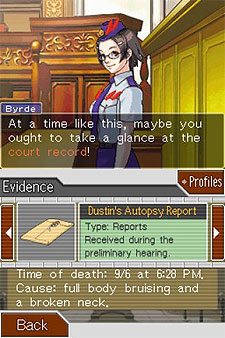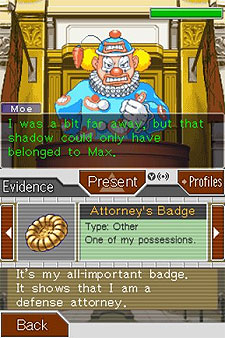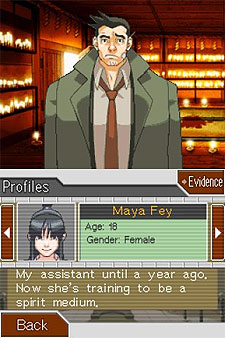"Will they ever shut up? Just shut up. SHUT UP SHUT UP SHUT UP!!"
"Okay, I just have to calm down. The game won't go any faster if I yell at it. I need to just try and ignore Edgeworth and Lotta's insipid insults and try to burn through this case. After all, the judge has to rule on it soon ... doesn't he?
"But
The first Phoenix Wright never elicited such bilious words from my mouth. Sure, Phoenix Wright: Ace Attorney had some occasionally grating characters in its courtroom, such as the irritating senior Wendy Oldbag and the dense actor Will Powers but, behind their quirks were well-intentioned folks, and I was happy to cross-examine and defend them in court. The game, despite it being an occasionally outlandish judicial drama (including spirit channeling and humorously fictitious courtroom laws & behavior) was still quite engrossing and occasionally poignant, regardless of the fact that its gameplay is constituted by little more than dialogue trees and inventory management. It was a sweet game whose grounded story and strong sense of its characters transcended its limited interactivity (even if I mostly ignored the narrative in last year's write-up).
Not surprisingly, a sequel was produced entitled Phoenix Wright: Justice for All, and many of the characters from the first Phoenix Wright reprised their roles. However, instead of the flawed-but-human roles we saw in Ace Attorney, Justice for All includes them only as items of recognition and tools in a byzantine array of cases. Justice for All removes any sense of goodwill or resonating emotions from them, and then sets each one up to be caricatures of their former role, thus robbing the interactive courtroom drama of all its heart and humanity. It's this sequel which has me in such a tizzy.
And why shouldn't I be? By the end of Justice for All I was wincing whenever Oldbag appeared on screen. I was cursing at the new prosecutor (an 18-year-old female part of the von Karma lineage). I was even shaking my fist (and, consequently, my DS) at the returning, overly obtuse, judge. While Justice for All has a number of flaws, its most prominent is that it utterly fails to reincorporate the pre-existing supporting characters back into the game.
When used deftly, as with Ace Attorney, supporting characters can be broadly drawn for the sake of a plot point, but you can still invest within them more emotional characteristics. Afterall, this is a courtroom drama, and your characters are going to be interrogated about their motives and asked for interpretations of what they've witnessed. The more nuanced the character is, the more interesting the case will be, as even if you know how the events played out, it's how the characters paint the events that create the drama. Without that imaginative frenzy, you're left with a hodgepodge of false witnesses, unmotivated lies and behavior, then, inevitably, boredom and frustration.
That's when the shouting comes in. Especially concerning the second half of the game.
The first case was more of a tutorial than an actual case, but I was quite fond of the unlucky young cop Phoenix was defending, and inflicting Phoenix with amnesia from the beginning was nicely played. The second case utilized the hokey 'your partner has amnesia and is indicted for murder' plot which is somewhat old-hat but it's a mostly unoffensive case – with a few exceptions. The first exception is the unwelcome insertion of Ace Attorney Southern stereotype Lotta Hart as paranormal investigator, who slangs and snaps her way through testimonies, while the second concerns the inclusion of eight-year-old Pearl, Maya's cousin and your new sidekick. Nothing quite says 'jumped the shark' like the addition of a precocious young tyke to the cast!
However, it's the third and fourth cases that are the most problematic. The third takes place against the familiar backdrop of a circus (any armchair detective can probably solve this one in their sleep, thanks to the constant re-use of the 'big top' in remedial whodunnits) is the most plodding of all cases, mostly since the primary characters involved aren't introduced until the second courtroom day, plus you're constantly subjected to hearing the same stories over, and over, and over again. By the last trial day, you'll be writhing, pleading for those on the witness stand to shut their traps so you can simply wrap the tired trial up.
But it's the fourth, and final, trial that broke me. It's set up as a 'homecoming' of sorts and re-introduces a litany of characters from Ace Attorney, including the previously mentioned Oldbag and Powers characters. Oldbag has become nothing but a tiring contrarian and Powers is practically useless in his role, lending only a convenient starting point for Phoenix & Maya at the beginning of the crime. While it certainly is the most ambitious Phoenix Wright trial in that it utilizes a wide assortment of locales and even has you control a character other than Mr. Wright, this case goes on forever thanks to a never-ending source of false twists, empty accusations and endless clarifications. It's a torturous trial, partially because its duration is played as a plot device, and in doing so it becomes padded, aggravating and drawn out well beyond necessity.
The game might have been able to get away with these frustrating cases too, had the involved parties been even remotely engaging, but no. The suspects in the 4th trial are one-dimensional characters from celebrity culture, distilled into a sole symbol or adjective. Detective Dick Gumshoe is back, but he's been (somewhat rightfully) fired from the force, as he's inexplicably become an absolute idiot, incapable of finding a haystack in a barn. Oldbag reprises her roll as a security guard, and her turns as a witness stand out as some of the worst moments in the game. Oldbag's more than a little resentful towards Phoenix Wright for constantly gunning against her fan-girlish objects of desire, but when she lashes out, everyone joins in: returning prosecutor Miles Edgeworth, the kindly, addle-minded judge and even the courtroom patrons themselves.
Why, you may ask? Part of it's certainly an attempt at humor, as the first game threw more than a few barbs at you, but after about the 50th insult about my intellect I longer found the topic amusing, no matter how cleverly it's stated (and sadly, most of the quips in this game fall a bit flat). What's makes matters worse is that, apart from Oldbag, the resentment from the supporting characters simply isn't merited. In the first game you were green, inexperienced and had no track record. In this second game, thanks to the events of the prior game, you should be able to command a bit of respect, or at the very least, there should be some sequence that cuts Phoenix Wright's courtroom stature down to size.
Instead, for huge swathes of time in this case, Justice for All feels like you're simply up for public mockery: The court will berate you and Mr. Wright sits there and meekly takes it. He's turned into a buffoon, a dim-witted dependent who can hardly stand on his own two legs and has to constantly rely on others, including his dead mentor, to bail him out of situations. When we left Phoenix Wright in Ace Attorney he'd turned into a man of determination, an out-spoken and eager attorney, but now he's little more than a dunce. There's no growth here, not only concerning the supporting cast but even our main character lacks even the slightest of maturation. In fact, all the returning characters have simply regressed, becoming nothing more than tokens in these overly convoluted cases.
In its finer moments, Phoenix Wright: Ace Attorney was an ensemble drama, uniquely rich for a handheld game, and it showed that developers can handle mature material on a handheld platform. It's too bad then that Justice for All is little more than a slapdash collection of madcap characters in evermore circuitous situations. It's the supporting cast's lack of resonance that drags down what could have been another excellent, slightly wacky, courtroom game. For as weak as Phoenix Wright himself is in the title, it's the characters he represents and interacts with that really gives life to these tales. If only they hadn't shoehorned in 'fan favorites' instead of constructing new characters, or if they had relied on the human drama of the crimes instead of incorporating outside antics to try to up the ante, perhaps the game would have been as solid and enjoyable as the first.







#1 RuinsEverything Mar 12, 2007 10:19pm
Interesting points. I'm new here by the way, and I like how you guys analyze the game beyond graphics, hours of gameplay, etc., it's refreshing.
I'd agree it's not quite as enjoyable as the first game, though I still loved every minute. The one thing that seems somewhat unique about the series's characters to me (not really a good or bad thing, and something you touched on a bit already) is that for the most part, the women are the strong characters in the game and the men are mostly weak and submissive. Phoenix depends on Mia and is bossed around by Maya pretty frequently as well, Gumshoe is very submissive to Franziska even though she is a teenager, Will Powers is 100% self pity. While the women (Franziska, Lotta, Oldbag, Mia, Maya) all have aggressive personalities, with just one or two exceptions (Adrian). Which works for some but not for others (Oldbag and Lotta need to go).
#2 Glenn Turner Mar 13, 2007 02:59pm
Thanks for your kind words! Concerning women being the strong characters in the game, that's an excellent point. Heck, even concerning Adrian, she's extremely frowned upon by practically all involved parties for her 'dependence' and her little facade, which certainly says something. Huh, interesting...